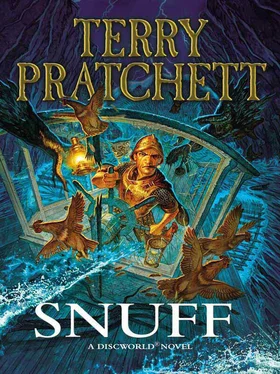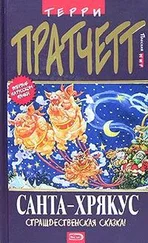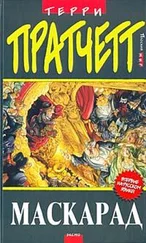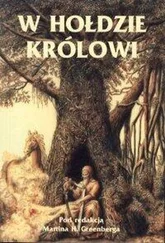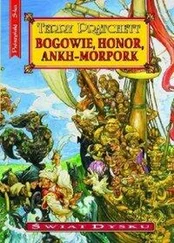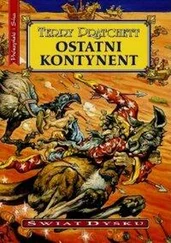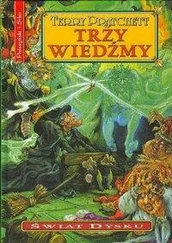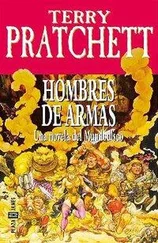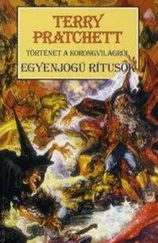‘Yes, but—’ Vimes began, but his wife silenced him with a smile. She had a special smile for these occasions; it was warm and friendly and carved out of rock. You had to stop discussing politics or you would run right into it, causing no damage to anything but yourself. Wisely, with a wisdom that had been well learned, Sam Vimes restricted himself to staring out of the window.
With the gate far behind he kept looking, in the fading light, to see the big house that was apparently at the centre of all this, and couldn’t find it until they had rattled along an avenue of trees, past what some wretched poet would have had to call ‘verdant pastures’ dotted with almost certainly, Vimes considered, sheep, through manicured woodland, and then reached a bridge that would not have been out of place back in the city. [3] Apart, that is, from the line of artistically naked ladies along its parapets. They were holding urns; urns is art.
The bridge spanned what Vimes first thought was an ornamental lake but turned out to be a very wide river; even as they trundled over it, in dignified splendour, Vimes saw a large boat travelling along it by some means unknown, but which, to judge from the smell as it went past, must have something to do with cattle. At this point Young Sam said, ‘Those ladies haven’t got any clothes on! Are they going to have a swim?’
Vimes nodded absently because the whole area of naked ladies was not something you wanted to discuss with a six-year-old boy. In any case, his attention was still on the boat; white water churned all around it and the seamen on the deck made what was possibly a nautical gesture to Lady Sybil or, quite possibly, one of the naked ladies.
‘That is a river, isn’t it?’ said Vimes.
‘It’s the Quire,’ said Lady Sybil. ‘It drains most of the Octarine grass country and comes out in Quirm. If I recall correctly, however, most people call it “Old Treachery”. It has moods, but I used to enjoy those little riverboats when I was a child. They really were rather jolly.’
The coach rumbled down the far end of the bridge and up a long drive to, yes, the stately home, presumably so called, Vimes thought, because it was about the size of the average state. There was a herd of deer on the lawn, and a big herd of people clustered around what was obviously the front door. They were shuffling into two lines, as though they were a wedding party. They were, in fact, some kind of guard of honour, and there must have been more than three hundred there, from gardeners through to footmen, all trying to smile and not succeeding very well. It reminded Vimes of a Watch parade.
Two footmen collided while endeavouring to place a step by the coach, and Vimes totally spoiled the moment by getting out of the opposite door and swinging Lady Sybil down after him.
In the middle of the throng of nervous people was a friendly face, and it belonged to Willikins, Vimes’s butler and general manservant from the city. Vimes had been adamant about that, at least. If he was going to the countryside, then he would have Willikins there. He pointed out to his wife that Willikins was definitely not a policeman, and so it was not the same as bringing your work home. And that was true. Willikins was definitely not a policeman, because most policemen don’t know how to glass up somebody with a broken bottle without hurting their hands or how to make weapons of limited but specific destruction out of common kitchen utensils. Willikins had a history that showed up when he had to carve the turkey. And now Young Sam, seeing his scarred but familiar smile, ran up through the row of hesitant employees to cuddle the butler at the knees. For his part, Willikins turned Young Sam upside down and spun him around before gently putting him back on the gravel, the whole process being a matter of huge entertainment to a boy of six. Vimes trusted Willikins. He didn’t trust many people. Too many years as a copper made you rather discriminating in that respect.
He leaned towards his wife. ‘What do I do now?’ he whispered, because the ranks of worried half-smiles were unnerving him.
‘Whatever you like, dear,’ she said. ‘You’re the boss. You take Watch parade, don’t you?’
‘Yes, but I know who everyone is and their rank and, well, everything! It’s never been like this in the city!’
‘Yes, dear, that’s because in Ankh-Morpork everybody knows Commander Vimes.’
Well, how hard could it be? Vimes walked up to a man with a battered straw hat, a spade and, as Vimes neared, a state of subdued terror even worse than that of Sam Vimes himself. Vimes held out his hand. The man looked at it as if he had never seen a hand before. Vimes managed to say, ‘Hello, I’m Sam Vimes. Who are you?’
The man thus addressed looked around for help, support and guidance or escape, but there was none; the crowd was deathly silent. He said, ‘William Butler, your grace, if it’s all the same to you.’
‘Pleased to meet you, William,’ said Vimes, and held out his hand again, which William almost leaned away from before offering Vimes a palm the texture of an ancient leather glove.
Well, thought Vimes, this isn’t too bad, and he ventured into unknown territory with, ‘And what’s your job around here, William?’
‘Gardener,’ William managed, and held up his spade between himself and Vimes, both as a protection and as exhibit ‘A’, proof positive of his bona fides. Since Vimes himself was equally at sea, he settled for testing the blade with his finger and mumbling, ‘Properly maintained, I see. Well done, Mister Butler.’
He jumped when there was a tap on his shoulder and his wife said, ‘Well done yourself, dear, but all you really needed to do is go up the steps and congratulate the butler and the housekeeper on the wonderful turnout of the staff. We’ll be here all day if you want to chat to everybody.’ And with that, Lady Sybil took her husband firmly by the hand and led him up the steps between the rows of owlish stares.
‘All right,’ he whispered, ‘I can see the footmen and the cooks and gardeners, but who are those blokes in the thick jackets and the bowler hats? Have we got the bailiffs in?’
‘That is reasonably unlikely, dear. In fact, they are some of the gamekeepers.’
‘The hats look wrong on them.’
‘Do you think so? As a matter of fact they were designed by Lord Bowler to protect his gamekeepers from vicious attacks by poachers. Deceptively strong, I’m told, and much better than steel helmets because you don’t get the nasty ringing in your ears.’
Clearly unable to hide their displeasure that their new master had chosen to shake the hand of a gardener before addressing either of them, the butler and housekeeper, who shared the traditional girth and pinkness that Vimes had learned to expect on these occasions, were aware that their master had not come to them and, he noticed, were coming to him as fast as their little legs would carry them.
Vimes knew about life below stairs, hell, yes, he did! Not so long ago a policeman summoned to a big house would be sent round to the back door to be instructed to drag away some weeping chambermaid or not-very-bright boot boy accused without evidence of stealing some ring or silver-handled brush that the lady of the house would probably find later, perhaps when she had finished the gin. That wasn’t supposed to be what coppers were for, although in reality of course it was what coppers were for. It was about privilege, and young Vimes had hardly worn in his first pair of policeman’s boots when his sergeant had explained what that meant. It meant private law. In those days an influential man could get away with quite a lot if he had the right accent, the right crest on his tie or the right chums, and a young policeman who objected might get away without a job and without a reference.
Читать дальше
